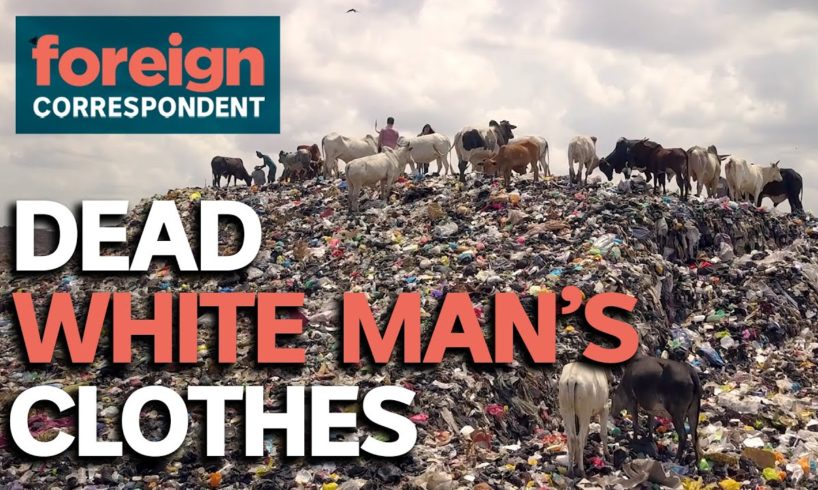
The dark side of the world’s fashion addiction. Many of our old clothes, donated
to charities, end up in rotting textile mountains in West Africa. This is a story
about how our waste is creating an environmental disaster.
Have you ever thought about what happens to your old clothes after you drop them off at the
op shop? It might be time to start, because these goodwill gestures are helping to fuel an environmental catastrophe on the other side of the world.
When charities in Australia can’t sell donated clothing, tonnes of it ends up being exported to
countries like Ghana, in West Africa. Ship after ship docks every week with bales from Europe,
the US, China and Australia.
They call them ‘Dead White Man’s Clothes’. Once they arrive in Ghana, they’re taken to the
bustling Kantamanto markets in the capital Accra and from here, they make their way to
villages and towns across the country.
The industry provides jobs for thousands of people, like Asare Asamoah, a successful importer.
He brings in clothes, mainly from the United Kingdom, and if they’re good quality, he can make
a decent living.
But it’s risky business. He has to pay upfront for a bale and never knows whether it’s trash or
treasure. With cheap, fast fashion flooding the world, the quality of the clothes arriving in
Ghana is getting worse and worse.
‘Sometimes you’ve gone and bought something, then you don’t get what you want’, says
Asamoah. ‘Then you lose your money.”
And there’s a dark side to this industry.
Correspondent Linton Besser travels to Ghana to uncover the dirty secret behind the world’s
fashion addiction.
While 60 per cent of imported fashion items are reused and resold, 40 per cent are rubbish,
creating an environmental catastrophe for this poor nation.
With the main dumpsite for textile waste now full, unregulated dumpsites ring the city. These
fetid clothes mountains are often set on fire, filling the skies with acrid smoke.
‘It is totally a disservice to us in this part of the world because we have become sort of the
dumping ground for the textile waste that is produced from Europe, from the Americas”, says
Accra’s waste manager, Solomon Noi.
Emmanuel Ajaab imports used clothes from Australia but he despairs at the poor quality of the
clothes that arrive. From a bale of about 200 garments, he finds only seven he can resell at a
good price.
“In Europe and UK and Australia, America, they think Africa here, sorry to say, we are not like a
human being”, he tells Foreign Correspondent.
The dumped textiles also get swept up in the monsoonal rains and end up choking the city’s
waterways and beaches, posing a danger to fishermen and aquatic life. Liz Ricketts, who runs
an NGO campaigning for awareness of Ghana’s textile waste crisis, lays the blame at the feet
of international fashion houses.
“Waste is a part of the business model of fashion. A lot of brands overproduce by up to 40 per
cent”, says Ricketts.
Noi begs the people who donate their clothes to think twice about where they end up.
“If they come here, like you’ve come, and you see the practicality for yourself, then they will
know that, no, we better take care of these things within our country and not to ship that
problem to cause problems to other people.”
About Foreign Correspondent:
Foreign Correspondent is the prime-time international public affairs program on Australia’s national broadcaster, ABC-TV. We produce half-hour duration in-depth reports for broadcast across the ABC’s television channels and digital platforms. Since 1992, our teams have journeyed to more than 170 countries to report on war, natural calamity and social and political upheaval – through the eyes of the people at the heart of it all.
Contributions may be removed if they violate ABC’s Online Terms of Use http://www.abc.net.au/conditions.htm (Section 3). This is an official Australian Broadcasting Corporation YouTube channel
source







This is all being framed as a bad thing, but many countries in the world benefit from the massive amounts of cheap clothing that get imported, both economically and materialy. The best use for used clothing is literally to reuse it until it is no longer useable, which is exactly what is going on with this clothing. The sales of it generate money for charities which continue to help poor people, and help create wealth in foreign countries. The fact that there are piles of waste material is more of an issue with countries that do not deal well with trash in general.
If there is any change that should be made here in the west it should be to use more natural materials that last longer and break down safely. These are typically better quality, and more comfortable anyway. Stop buying cheap, made in China synthetic crap clothing.
Quite a devastating and honest documentary that anybody, who has the ability to buy new clothes, needs to watch! I will certainly watch what I donate from now on, these Guayanans deserve so much better..
Not sure what being white has to do with this but OK lol the media will always find a serious issue and somehow manage to make it about race.. I swear these people get off on race baiting…
How many of these are discarded from MAJOR thrift stores?
I still wear a t-shirt I bought in 1987, I have a quilt cover from 1980 as well.
It's a shame how "crap" is dumped on the poor in this world.
I would like to buy some of those clothes
Well now i know where i can thrift like a maniac; however people should do more to clean this big mess
You should not feel guilty. Sad to say that human nature is the same everywhere and if the situation were reversed they would be doing as people in the West do. That is a fact. The ones who should feel guilty are globalists, particularly that they encourage cheap man-made things that don't rot down quite quickly when exposed to the elements as cotton, linen and natural fibres do. When things are buried and protected from air, damp etc., then they don't rot. They are preserved. Even natural fibres, wood etc. Imagine how much longer still man-made materials last when buried at tips.
Zero carbon means zero life. Any life. All life is carbon based.
The problem isn't with the donated clothes since there IS a need. Why aren't they getting to the people who need them. THAT is the problem.
If this was called dead black people clothes people would be upset,🤔
Shame to African leaders
Racism in action
First world fashion rubbish dumped in the 3rd world
what a dilemma. employment and money (albeit minimal) for many yet massive environmental pollution, and the destruction of local industry.
History of European Colonialism & American Exceptionalism. Steal, pillage and plunder the riches of developing world
It's a giant goodwill
Savers/ Value Village.
Does 100% cotton have a quicker break down? What about the smoke from the polyester blends being burned? Why is this not talked about more? Why is media not reporting this? Same with the mines going on in Africa. We are trying to solve our environment problems while making everyone else's worse. It's seems like classic feel good syndrome.
More racism I see by leftest media
A very difficult life indeed.
Cut up the better pieces of rags and sew it into strips and make clothes
"Dead white mans clothes"!?! Can you guarantee that none of these clothes have been worn be people of color!?! Racist much!?! Liberals immediately jump on the racist bandwagon and then don't even realized that they are being manipulated. Liberals also can't logic enough to understand the title of this is nothing but propaganda. There is no way anyone can say these are "dead white mans" clothes. It is an illogical conclusion. This is a glaring case of white people "can't do anything right". If these clothes aren't sent to poor countries, then they are racist for not sending them. Liberals really need to stop with their hypocrisy and double standards!!! What I get out of this is, a lot of poor people in this video can make money selling these "dead white mans clothes" and provide some kind of life for their families. To solve the problem of second hand clothing, I say that we stop sending them. No clothes, no problem with waste. Problem solved. But, that would be racist. This is nothing but liberals speaking in circles and not saying anything.
That's what smart nations are doing, they send all there second hand stuff from electronic to vehicle and much more in the name of donation to these under developed nations because they know they can't dump the things in their own backyard since it will pollute it so it's a smart strategy.
D😢MN‼️
You didn’t need the racist title. “Americans’ clothes” would’ve worked fine.
I was 125 lbs. when I was 19 yrs old and I still wear my my clothes that I am 55 now. I just got lucky that my weight is still 125 lbs.
But some folks have different experience, so I don't judge others. It's not the end of the world, there's no bloodshed when you wear new clothes.
why not start a little business turning the non-sellable clothing into cleaning rags or other useful items. I don't get why they just dump it. Seems like they could create some jobs finding a use for it.
So we donate clothes to africa because late night tv shows naked not eating africans begging for donations so we send clothes the africans quickly sell the free clothes to the rich and instead of giving the poor the rest they throw them in the ocean and that's are problem how? This is why we shouldn't help anybody
Thankfully I'm not into the fashion scene. I have clothes I've worked for 35 years. I thought clothing was recycled too. If something can be used by someone else, donate.
The white man's clothes? Brown people also buy new shirts etc….
Even the dead white man is toxic on catastrophic level.
😓😓😓
instead white men calling themselves the Savior they should call themselves th problem creator destoriers of earth.if the western wrld haven't stolen wealth form 3rd world they never would have been 3rd instead it would hav been other way around.atleast if the people of 3rd world living apy no.then who is having good life from all this
Oh then lets stop sending them.
I think the clothes being sent to West Africa is getting worse because people are starting to profit from selling their clothes online rather than give away for free. What they give away probably couldn't be sold. But soiled clothing should not be accepted for donation anyways. This is a terrible issue effecting human life, animal life and the environment.
We make braided rugs out of strips of old everything! We look at those piles of clothes and think it’s such a waste and what could be done with the material! And someone over there should start a business and then sell those rugs and make money so they can make a better life.
Nobody’s gonna mention those poor cows living on the off the books dump eating garbage?!?! Omg those poor animals 😣💔
Our gluttony has already consumed us; we're just making advanced payments before the end 🙂